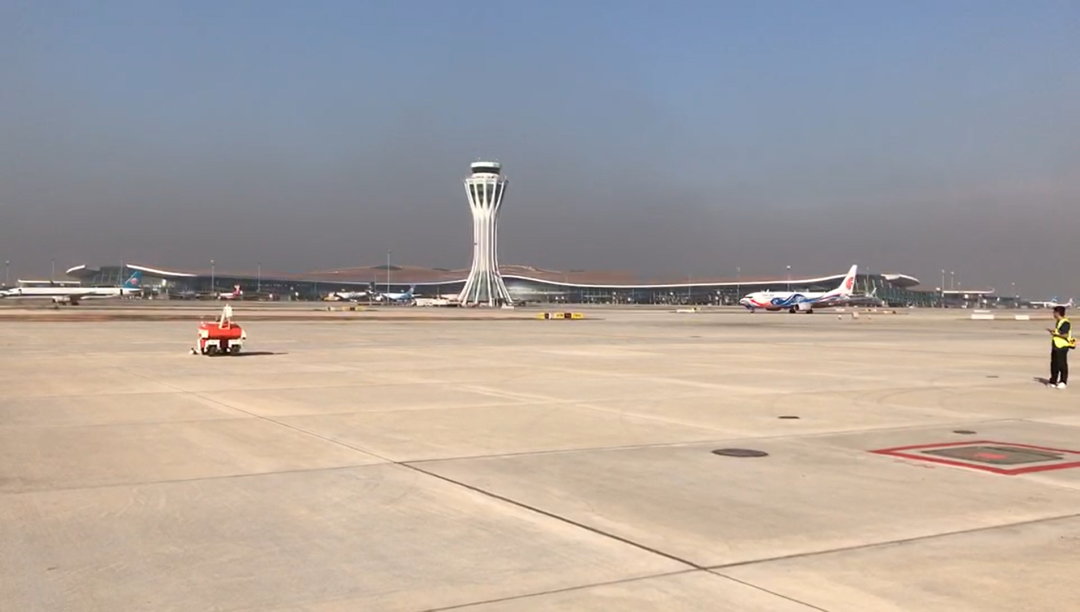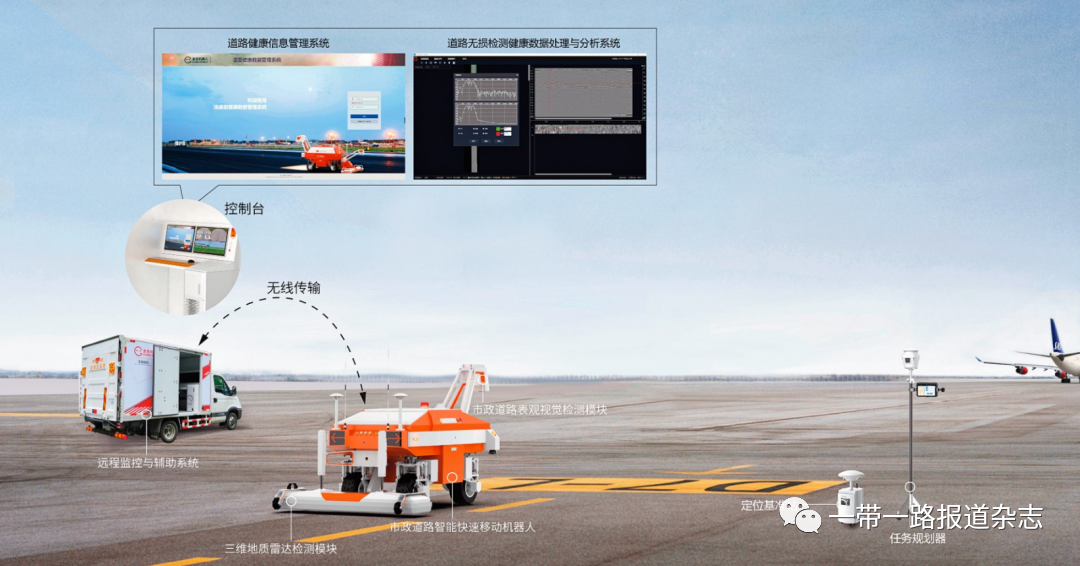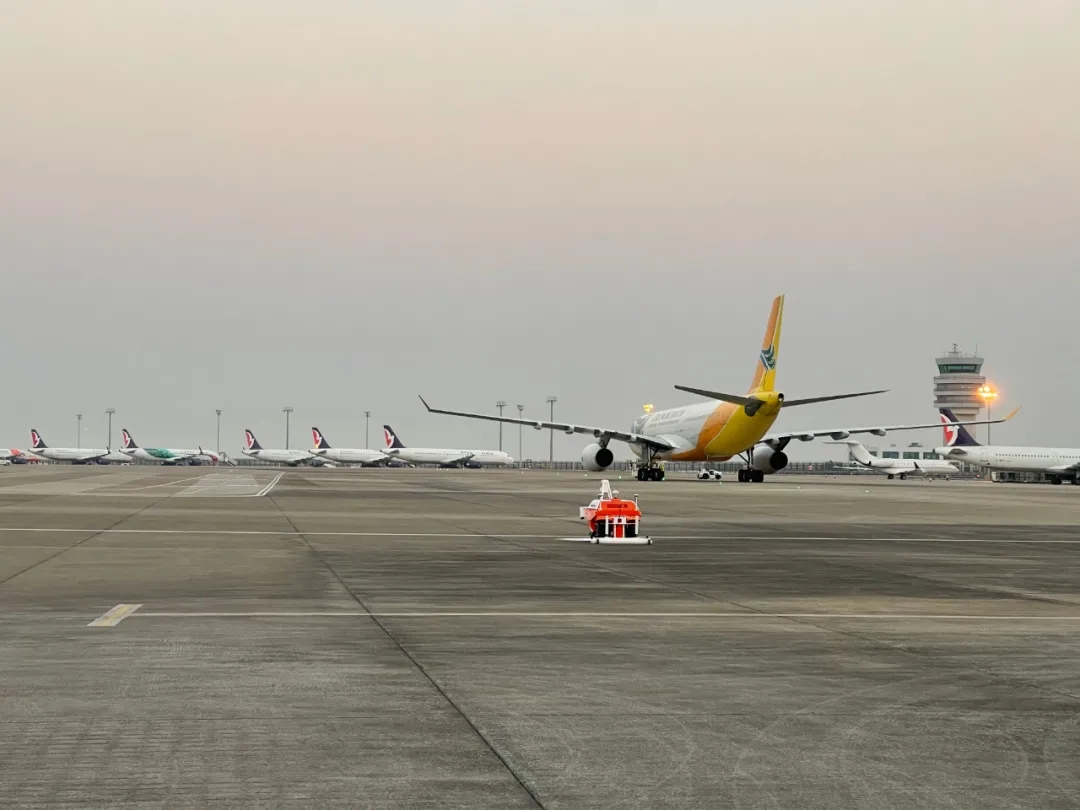Source: “One-Belt-One-Road-report” Issue 2, 2021


“Science is the nervous system of our time.” The world has undergone earth-shaking changes after the first three technological revolutions. The human society now sees unprecedented prosperity.
The fourth is taking place into the 21st century. People have found new ways to change the world with more technological means, among which, artificial intelligence has contributed great economic value as it is widely used in life and production. The Chinese company Shanghai Guimu Robot Co., Ltd. is a leader in this industry and a pioneer in roadbed disease detection robots (which serve to conduct comprehensive and precise detection of the performance and structure of airport runways and highways at all levels based on artificial intelligence).
From an exhibitor to a partner
Hannover Messe was held as scheduled in Germany on April 2013, where the idea of “Industry 4.0” was proposed for the first time. The event further strengthened the influence of Germany as a technological power. Dr. Jochen Koeckler, Chairman of its Managing Board, said that the integration of manufacturing will have a huge impact on global industries in the next 10 to 15 years, and the fourth industrial revolution is being greeted.
The grand event attracted over 6,500 exhibitors from 65 countries and regions, with 730 from China to witness the technological charm and power from around the world.
Six years later, in 2019, Guimu’s founder and chairman Gui Zhongcheng attended the German Talent Meeting, where he talked about the company’s innovations in the detection of pavement structures by specialized robots and listed examples. After the meeting, Dr. Gui Zhongcheng was introduced by the organizer to the head of Munich Airport in Germany, and was told that Germany, now with a gap in this area, would like to work with him in safety detection for airport runways.
.jpg)
The COVID-19 outbreak in 2020 became barriers to international cooperation. Germany, however, still keeps this Chinese company in mind. In early 2021, it sent an invitation letter, stating that it would like to proceed cooperation with Guimu if it can make an inspection visit to Germany this year.
It took merely few years from the company’s participation in Hannover Messe to the invitation for cooperation. Previously a cautious explorer, China is now a bold technological innovator, thanks to the national policy. Chinese technological enterprises have thus been provided with support in policy, finance and talent.
Guimu looks forward to the future based on the intelligent detection technology
The world has fought COVID-19 for the past year. Also in this year, Guimu won the support from the Ministry of Science and Technology for its project “Runway Safety Detection Robot.” It greatly enhanced Dr. Gui’s confidence in the development of intelligent robots for the three-dimensional overhaul of major transportation infrastructure.
In 2016, Guimu was officially founded. “Gui” in the name is an ancient instrument for measuring the shadow of the sun (hence as a standard or a benchmark), and “mu” represents wisdom. “I want to make a benchmark in the field of transportation infrastructure safety and intelligent detection. Guimu looks forward to the future based on the intelligent detection technology,” said Dr. Gui Zhongcheng full of ambitions.

Only three years after its founding, Guimu, with the special support from the Ministry of Science and Technology and the Civil Aviation Administration of China, joined hands with top robotics scholars and related institutions at home and abroad, and launched the innovative roadbed health detection robot. It has been put into use in major airports across China, especially the intelligence-based Daxing International Airport in Beijing.
For airports at home and abroad in the past, the roadbed safety and health were mainly detected manually on a regular or special basis, so as to evaluate airworthiness and make decisions on maintenance, repair and renovation. Roadbed is one of the most important assets for the airport, and its health status has exerted decisive influence on the safety, efficiency and scientific operation of the airport. Therefore, to guarantee its safety is a top priority. With the use of roadbed health detection robots, semi-automatic sampling and detection, low-frequency static evaluation, single-source information analysis, post-event passive extensive maintenance based on experience, and staged discrete management were abandoned for roadbed management and maintenance at airports. In their place, high-frequency dynamic evaluation and early warning, multi-source heterogeneous fusion based evaluation, data-based preventive precise maintenance, full-life cycle intelligence-based management and maintenance, and comprehensive and accurate detection have been adopted, which makes it more digital and intelligent.
An orange-red robot is often seen on certain sections of G98 Island Hainan Ring Expressway. It was developed by Guimu for detecting the roadbed and structural diseases. These sections are located in volcanic areas rich in water and with high-liquid-limit soil. Diseases such as rutting, shifting, upheaval, and subsidence frequently occurred since G98 was opened to traffic for the past 20 years. There was no significant improvement even with several overhauls. Hainan Provincial Highway Administration learned about Guimu and bought its robot for the detection of certain sections with serious diseases. It provides accurate data, which, along with scientific decision-making, have contributed to the formulation of design schemes.

International cooperation under the global layout
At the Belt and Road seminar held at the World Transportation Conference in May 2020, data shows that as of 2019, there were over 500 airports in China. The total number of large airports abroad had reached 3,521. It is estimated that the number in China will reach 2,000 by 2030, and the runway detection market share for civil airports alone had reached 22.4 billion yuan. The investment in highway maintenance in China has risen year by year to about 480,000 yuan per kilometer, and the estimated market share can reach 24 billion to 48 billion yuan.
Seeing the data, Gui Zhongcheng knew that he made the right choice. Born in Dabie Mountains, Anhui, he was admitted to Tongji University in Shanghai 24 years ago and majored in mechanical engineering and automation. After graduation with a master’s degree, he worked in robotics R&D and management for Tsinghua University, DEC, Texas A&M University, and BOE. Given China’s prospect for technological development, and with rich theory and the pioneering spirit of a young man, Gui Zhongcheng decided to start his own business in 2015. In that year, the Belt and Road Initiative, with infrastructure building as a key component, was proposed and put into practice. Gui Zhongcheng and two teammates made the market research and decided to build a road safety detection robot.

Today, Guimu has robotics R&D bases in Shanghai, Beijing, Chengdu, and Anhui in China, laboratories in the United States and Germany, and offices in Singapore and Finland. The base in Chengdu alone has more than 50 employees, two-thirds of whom are researchers.
“COVID-19 hinders the international cooperation and has slowed our pace of going abroad, but we will not stop. Next, we will focus more on the Asian and European markets, and strive to bring intelligent robots to the global market,” Dr. Gui Zhongcheng said confidently.
Dialogue with the founder Gui Zhongcheng:
Reporter: As a leader in the industry, what do you think is the most difficult?
Gui Zhongcheng: Intelligent robots for roadbed detection are a market segment with no reference. It is difficult to cultivate the market from scratch, and it is even more difficult for people to recognize its technological value. We do it through demonstration. Even when customers see the value, we need to approach them to introduce it to more industries. It is about value identification. It’s difficult, but we have persevered.
Reporter: What do you think is the most important for doing business in such a new field?
Gui Zhongcheng: We are a start-up, and technological innovation is the only path. Technology and product innovation are critical. Also, the cultivation of talents requires discernment and long-term training. Innovation is fundamental. Talent is the cornerstone, and we are competitive in endurance and perseverance.
Reporter: The company won support from the Ministry of Science and Technology in 2020. What does that mean, in your opinion?
Gui Zhongcheng: It was difficult to get the support. Our competitors are outstanding state-owned enterprises. The support indicates the governmental and social recognition of our technical foundation, and also shows that the industry is in line with future. It gives us enough confidence and courage to keep on.